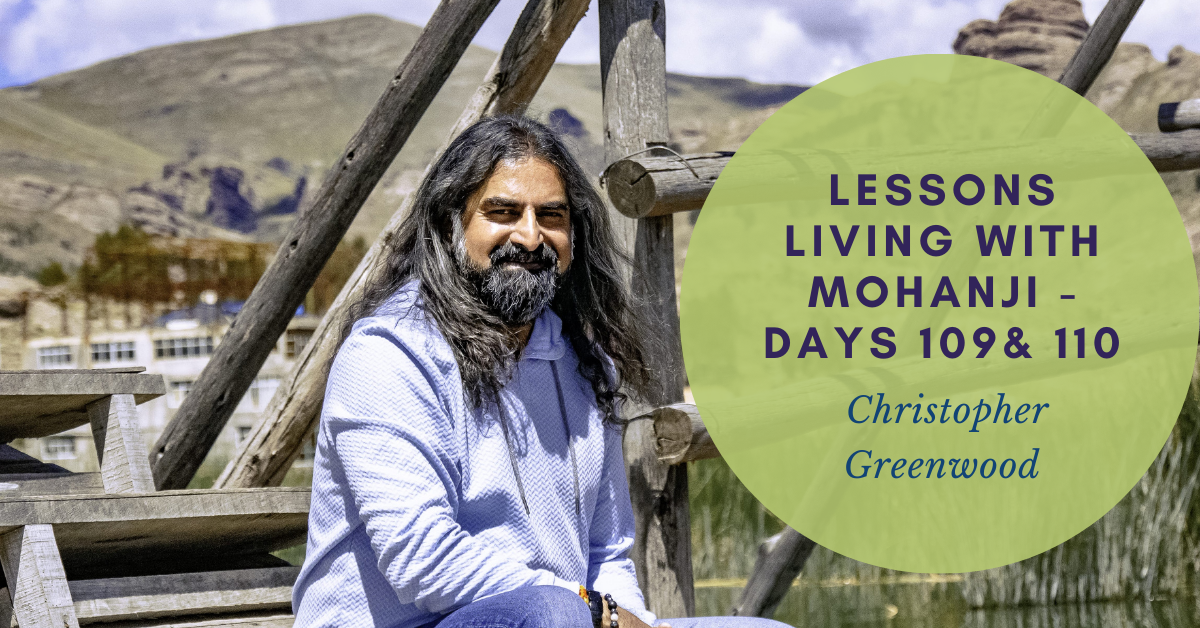by Christopher Greenwood
Day 109 Lesson – “Our Path is not complicated.”
Good morning, everybody. I hope that you’re doing well.
Over the past few days, I’ve had the opportunity to go back over some of the notes I made during conversations that spontaneously happened with Mohanji at the house. Some of these have proven to be great reminders for me.
I’d like to share some of these with you over the next recordings because I think they give wonderful lessons and clarifications on some important aspects of our path, of Mohanji, and what it’s like to walk this path. Mohanji has said before that this is a path of no-nonsense, the path of Shiva, and the path of fire, which means that there will be challenges and hurdles. Now looking back, some of these have resonated with me as good reminders.
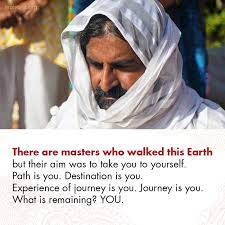
Today, I wanted to share what Mohanji spoke in conversations about the path. Some of these will be notes as I took them. Some of them could be words that Mohanji said, so I apologize if it doesn’t come across as one succinct flowing piece of voice.
Mohanji essentially said that this path is not complicated at all. All that’s required for the path of an Avadhoota is a deep, unshakable connection with the Master. And this was the case for all the Avadhootas, just connection to the Master. Thus, if I consider Mohanji as the Master, then it’s a deep, unshakable connection to Mohanji. This is not complicated. “But why then”, he asked rhetorically, “why is it complicated? Why can it be complicated?” He said that’s because of the mind.
The mind itself can create tests. The Master has no interest in testing anything because all the Master is doing is simply being available for people to connect to. People can connect, or they don’t connect – no problem, a master has nothing to do with it. Mohanji explained quite nicely that we are all on our journey in life. Each of us has a unique journey. Situations will keep changing, different situations will happen, and a corresponding effect will be there. And he reminded us that the Master is not creating this; our karma is creating it.
For me, this was an interesting understanding. Because it’s our karma that allows us to come to a certain situation in life, even to have a certain awareness, or even the opportunity to connect with someone like Mohanji. We don’t know exactly what’s happening, but we can be sure it’s because of our karma. As karma brought us to this situation, it can equally take us away. He reminded us that our job is simple in a way, just to ensure that we have alignment with all our activities so that we’re focused on the real purpose. Because then everything else is not so important.
In that case, a Master will know what’s good for us, what’s necessary, and will give what’s necessary, no more and no less. This gives stability all the time, and steps can be taken in a stabilized manner. Only what’s essential is given, and our job is to stay integrated simply – no doubt, no criticism, no judgments.
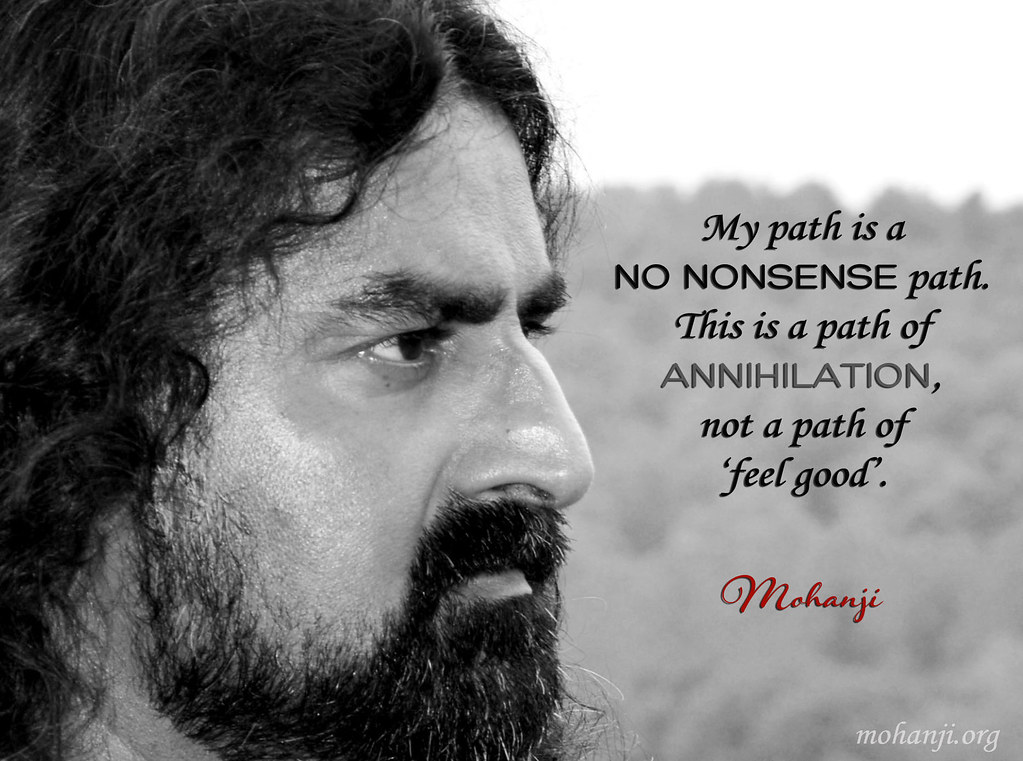
Mohanji shared a story about one person who saw Sai Baba eating onions, and because of that, he left Sai Baba. What was the problem? It wasn’t that Sai Baba was eating onions that the problem was. His concept of the situation was the problem. He decided that a Master shouldn’t eat onions and left. Mohanji reminded me that it doesn’t matter what you’re doing once you cross over because you’re operating from a plane of grand existence.
But for the majority of us, we’re operating at the karmic level, which means that there’s a price we have to pay for everything that we do, everything counts. Once we cross over, there’s no karma. So, there’s no desire, inclination, and there’s no price. It’s just responding to the situation. That’s how masters exist. They simply respond, reflect, respond, reflect. When someone comes with anger, emotions, a master will respond accordingly; he reciprocates. He’s not projecting anything. He stopped projecting long ago; there’s just a reflection; there’s no karma.
Mohanji also explained that there’s no testing on the path; there’s no interest in testing because who are we to be tested? He simply explained that the path itself is like a flowing river. It’s just flowing. To say that these tests come from a Master is like saying that the flowing river is interested in me taking a bath in it. The river doesn’t care. We can take a bath if we want to, and we need not take a bath if we don’t want to. But if we enter, we’ll get wet. We should know that. The river doesn’t need to tell us that we’ll get wet if we enter. That’s for us to know, for us to understand.
Mohanji explained that this is how things work. The Master is like a flowing river, completely flowing. And if we want to use the Master, we can use him. But the Master is not telling, “Please come and use me.” This was an important reminder because I’ve seen that Mohanji is not binding anybody to himself. He’s not asking anybody to come. But to those coming to him, including myself, he’ll give very clear instructions and directions to say, “Do this” or “I think you should do that.” Because what that does is break boundaries and comfort zones so that reality can be seen better. This is what he does.
Apart from that, he’s not binding anybody. If anyone wants to come, that’s fine. If they want to leave, no problem. He is available for our evolution and our growth, just like the flowing river. If we want to use it to take a bath, we can jump in and let it take us. And at the same time, if we don’t want to, no problem. Regardless, Mohanji will still be there, as the river will still flow.
I hope you have a great day ahead. I will speak soon.
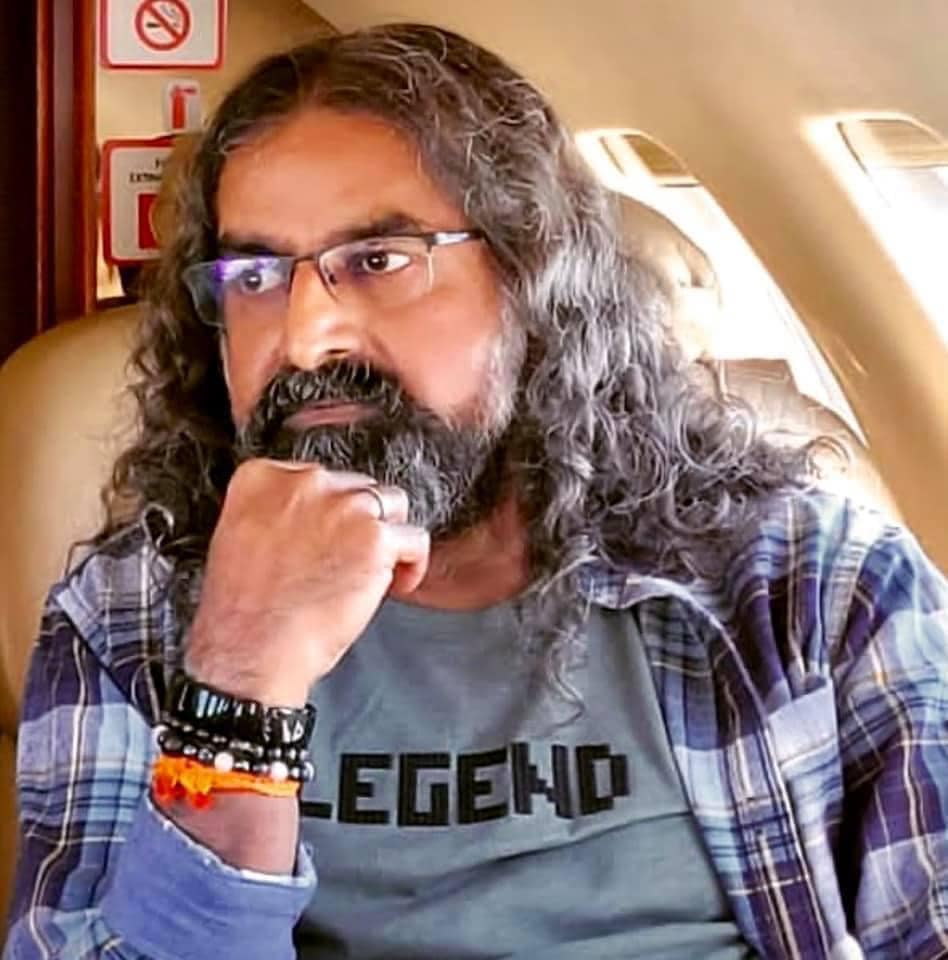
Day 110 Lesson – The magnetic pull of tamas
Good morning, everybody. I hope you’re doing very well.
Today, I share another of my recollections of the notes I made some time ago. I think this one is very relevant, and that is not to underrate comfort zones and tamas.
Mohanji said that the root cause for all the calamities in the world is tamas. For people who don’t know, tamas is extreme inertia, procrastination, sleeping, indifference, and settled in comfort zones. Thus, he said that the comfort zone is the root cause of disturbances. Because if a society is proactive, creative, benevolent, alert, and aware, there’ll be no calamity. But when tamas comes, people are taking it easy, procrastinating, talking too much about rights, instead of acting on responsibilities. And that causes wars.
This was quite an interesting insight for me because when you look at the world and the general sentiment of society, you can see this. Nobody wants to do anything. Then, anybody can come in and manipulate, which is what we’ve seen. In a proactive society, which would be based on Dharma (righteousness), there’ll be no wars because the right action is always taking place at the right time.
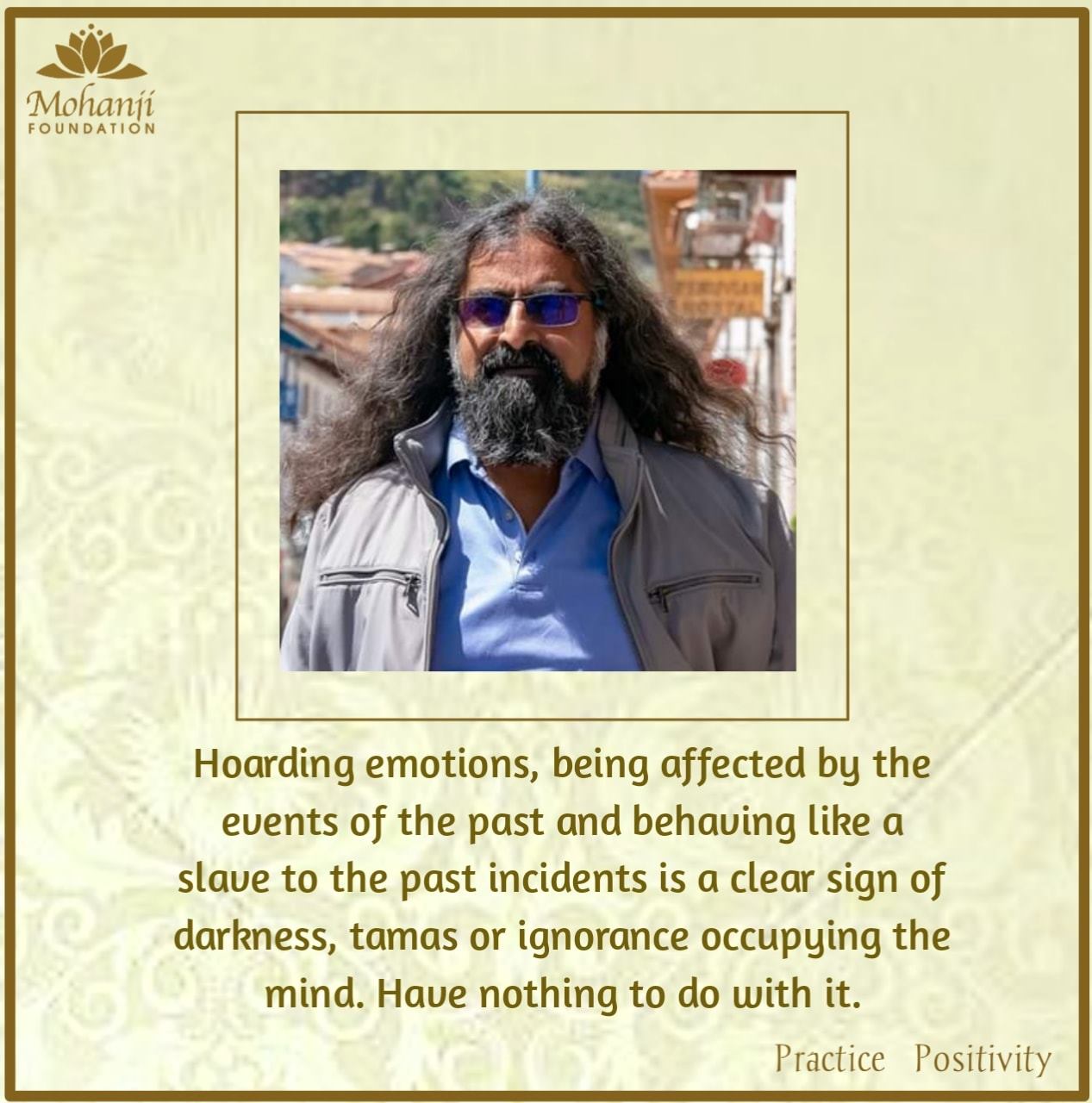
Extreme tamas is inertia, procrastination, sleeping. Mohanji shared that we have to break out of that if we’re seeking elevation. Living with Mohanji has definitely meant there’s no room for tamas; he makes sure of that. He kicks tamas’ butt, as he says. But I know from my own experience that it comes back; comfort zones pull back, and I’m more aware of that now.
Mohanji also gave a good illustration which helped me picture this in my mind. He said, “Imagine that you had a huge iron rod on your back, or a thick coat of iron. And your bed is a huge magnet”. So, the majority of people in the world are stuck on that bed, i. e. the magnet, with the iron rod on our back. We’re eating, sleeping, drinking, procreating, the usual unconscious life, tamasic life, not caring, breeding indifference and comfort zones.
We’re lying on the bed with a magnet and this huge iron rod. And we can’t get up and go. It’s very, very difficult because we’re stuck to the magnet. Mohanji said that the path from there is at least sit up in the bed; you must take it step by step. So, you are rising to the level where you still have part tamas and part rajas (action). You have the initiative to do something. Mohanji said that if we’re associated with a Master who’s doing something in the world, like Karma Yoga, it comes in very handy because Karma Yoga is a selfless service, which means that you’re engaged in action. And slowly, slowly, you’re removing the junk of tamas.
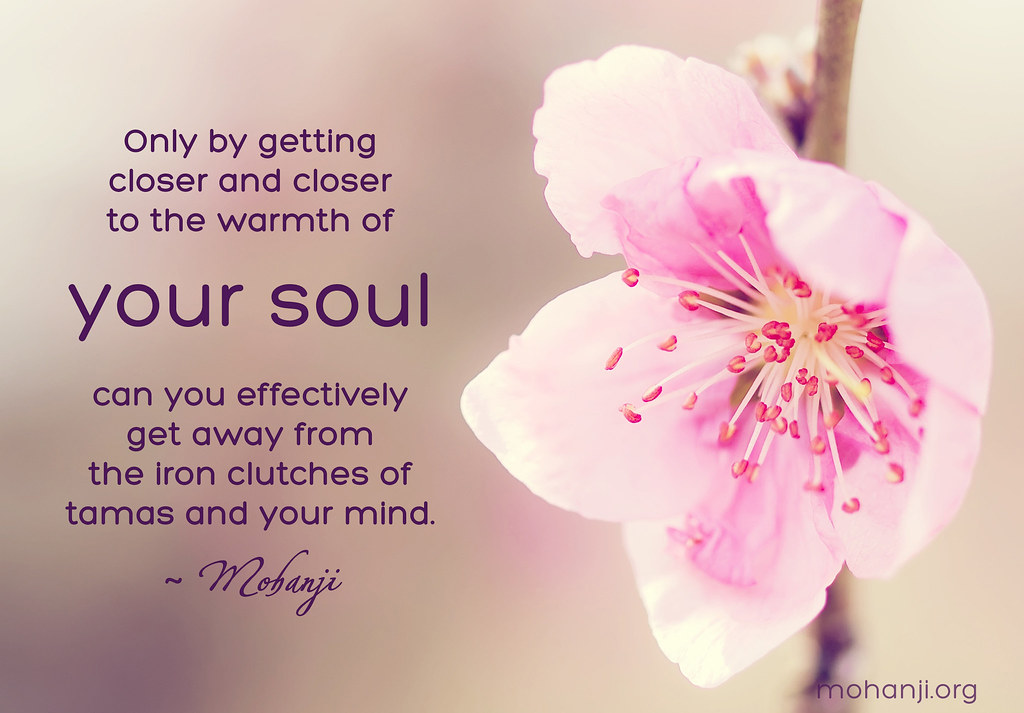
Then, the next step. Once you reach that point, the pull of the magnet is lessened, so then it’s time to stand up. This means that you have some more initiative, more rajas, more activity to stand up. Again, the Master will help you stand up, encourage you to engage in activities, give work, give guidance so that you slowly come out of that cycle of tamas. After that, we have to start walking; we have to practice it. That means we have to practice what the Master tells us to do, not what we’d like to do. Because what we would like to do (if we understand that tamas is connected to comfort zones) is moving back into what’s familiar.
A Master will tell us what to do, not that he needs us to do something, but he’s guiding us through the right course of action for us to move out of tamas, to break it. He tells us how to come out of it. At that point in time, if we say, “I’m not interested in that, I’ll only do what I like. I don’t feel like it anymore. Why do I have to do this?” – that’s when we’re falling back into a comfort zone.
In that way, people become lazy. Then they sit on the bed, and then before they know it, they’re lying back on the bed, with their back stuck to the magnet with the iron rod. They are so relaxed in the bed that they can’t even move their hand to take the food. They’ll open their mouth and say, “Please feed me.” Like that, you’re back lying on the bed again. Then you have to begin all over again, with all the effort, to first sit up in the bed, then stand up.
Mohanji shared that this can be an interesting and difficult trap for some people because they move through life with great initiative and speed, and they accomplish many things. And then what can happen is, because they’ve reached a place of comfort, where they have power, money, they can hire help, they can do what they like to do, and then in the bargain, they can begin to fall again. Thus, that can be a trap. What I understood from that is that we always need to have movement to always do something and never settle. There’s always an evolution, then.
When we finally stand up, Mohanji says that the next stage is to start running. This is where there are lots of rajas. This can be a dangerous time because we feel great, we have the grace behind us, many things are happening. Mohanji explained that this could be dangerous, too, because there can be a lot of predators who recognize that one has gained some spiritual balance, and they’ll want to take that. They’ll start to share ideas or doubts such as, “You’re doing so great, you could be so much more. Look, your Master is holding you back. He wants to keep you like this; he wants to control you.”
This happened to people who’ve been connected to Mohanji, and then they’ve left him to experience the big fall. But a Master doesn’t give everything because he’ll only give what can be individually handled at that time. He can’t give something which we can’t handle, because again he will also fall back. He says, “Okay, sit, now stand, now walk, walk gently, strengthen your legs, gain momentum, and then eventually you run.” It’s not that a Master can give 10 kilos when we can only lift five because we will just collapse.
This was a really good conversation for me because it was a reminder that we would only be given what we could handle at the time. We won’t be given anything which can take us down or cause us to fall. That’s not in the interest of a master. It’s not for him to say, “Okay, take more and more and more,” and then we die. Then it’s finished. It’s not to do that at all.
Until we have reached that stable state, we will always be prone to this sway of comfort zones pulling back and the risk of lying down on that bed with the magnet, to be stuck, to have to go through a lot more effort again just to even sit up. However, the Master will guide us to the right activity to bring us out of it.
I hope you have a great day ahead, and I will speak to you soon.
I hope you have a good day ahead and we will speak soon.

|| JAI BRAHMARISHI MOHANJI ||
Edited & Published by – Testimonials Team, 13th March 2022
Disclaimer:
The views, opinions, and positions expressed by the authors and those providing comments on these blogs are theirs alone and do not necessarily reflect the views, opinions or positions of Mohanji, Mohanji Foundation, it’s members, employees or any other individual or entity associated with Mohanji or Mohanji Foundation. We make no representations as to accuracy, completeness, timeliness, suitability or validity of any information presented by individual authors and/or commenters on our blogs and will not be liable for any errors, omissions, or delays in this information or any losses, injuries or damages arising from its display or use.
We reserve the right to delete, edit, or alter in any manner we see fit blog entries or comments that we, in our sole discretion, deem to be obscene, offensive, defamatory, threatening, in violation of trademark, copyright or other laws, of an express commercial nature, or otherwise unacceptable.
Mohanji Testimonials team


